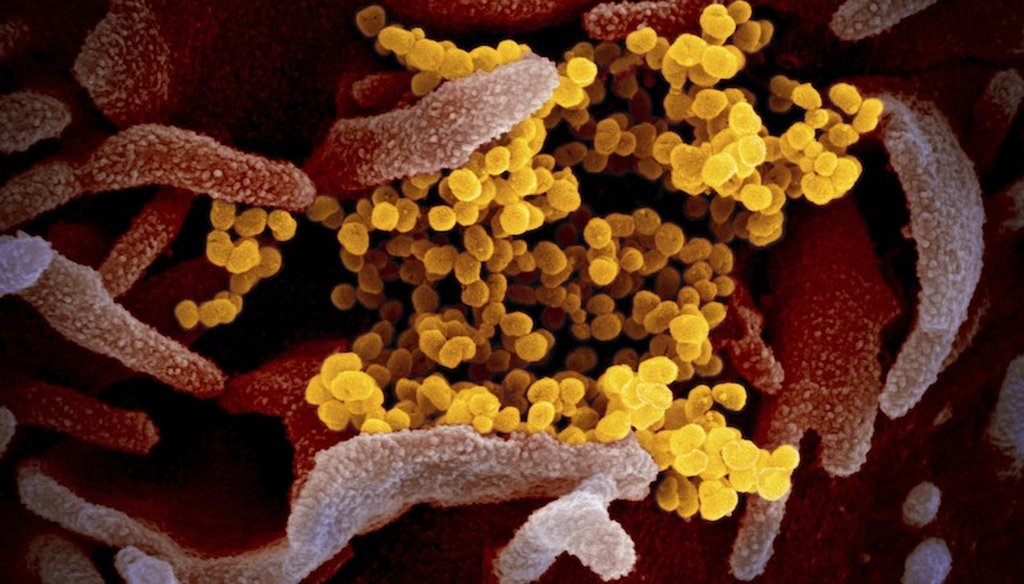Stand up for the facts!
Our only agenda is to publish the truth so you can be an informed participant in democracy.
We need your help.
I would like to contribute

This microscope image shows SARS-CoV-2 (yellow)—also known as 2019-nCoV, the virus that causes COVID-19. (Credit: NIAID-RML)
We’re all fact-checkers now.
In these days of COVID-19, everything needs to be fact-checked. Posts on social media need fact-checking. Texts and messages from friends and family need fact-checking. The president needs fact-checking at his daily press conferences.
We can’t accept everyday information that comes our way during a critical public health crisis. We have to go looking for authoritative sources. We have to check and double check. And even when messages are well-intended — that sweet email from our great aunt about coronavirus cures —the information isn’t necessarily right.
That’s where fact-checking comes in, and it's why we're particularly celebrating today, April 2, as International Fact-checking Day. We’ve been fact-checking furiously in recent weeks here at PolitiFact. We’ve continued our traditional work fact-checking of politics and election-related claims, as well as our fact-checking of posts flagged on Facebook via the platform’s third-party fact-checking program. Most of our work lately has revolved around the coronavirus.
We’ve debunked silly-sounding claims of false cures using salt water, bleach or orange peels. We’ve dug deep into whether the new coronavirus will be seasonal — it’s too soon to tell. We’ve corrected claims on the availability of testing and the amount of funding for fighting pandemics. That kind of work will continue for the foreseeable future.
PolitiFact isn’t alone in this work, either. Our fellow fact-checkers in both the United States and around the world are doing similar work either debunking or verifying. Many of us follow a code of principles, created by the International Fact-Checking Network, that promotes nonpartisanship and fairness; transparency of sources; transparency of funding and organization; a published methodology; and a commitment to an open and honest corrections policy. We’ve formally committed to these principles along with more than 70 fact-checkers from around the world.
But it’s not just professional fact-checkers who are doing the fact-checking. People just like you are getting messages and seeing online posts. But before they hit the share button or press forward, they’re checking it out, doing a Google search, or looking to their favorite fact-checking website for either confirmation or a debunking. If it’s wrong, they’re sending gentle corrections back to the senders.
This is the kind of day-to-day fact-checking work our society needs right now. Knowing whether a particular statement or claim is true or false is the foundation on which we make sound decisions for our families and about our health. It’s the basis on which we can judge our elected officials and make decisions about how to govern ourselves in a democracy.
But the true spirit of fact-checking is so much larger than that.
We have to ask ourselves: Are we willing to use evidence, reason, science and logic to govern our actions? Or do we react on impulse and emotionally, often out of an intense flash of fear or anger? Do we use prudence and thoughtfulness to come to a decision, or do we indulge our instincts and then stick to our stance no matter what?
It’s a critical decision, and one we each get to make daily, even hourly.
If you’re reading this, we hope we can put you down for the side of evidence, reason and logic. That’s what we want to celebrate here on International Fact-checking Day.
But if we’re honest with ourselves, we know there are times when we don’t want to be reasonable, when we want to go with our gut reactions. We’re human beings after all. Our humanity gives us our capacity for anger and fear, but it also gives us the ability to feel generosity and love. So we should value our emotions, but we also need a clear-eyed understanding that they can lead us astray. Holding each other accountable to truth helps us all live better.
When we reason together, using facts and transparency, we can be our best selves. And that can make every day a happy fact-checking day.
Thanks to reader support, all of PolitiFact’s fact-checking is free and accessible to anyone on the Internet. Please consider a monthly donation today. To receive a free weekly email with PolitiFact’s work, sign up here.





















































